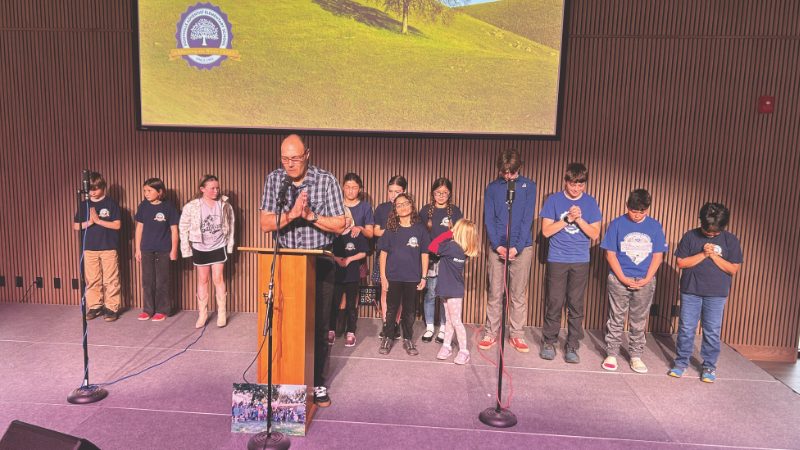Make no mistake, the church is legitimate. It is Christ’s idea. He started it when He declared, “On this rock I will build my church” (Matthew 16:18).1 The church belongs to Him and He Himself is its foundation. The confession of Peter in verse 16, “You are the Christ, the Son of the living God,” is the rock-hard, everlasting granite the church is built on.
And what do I mean by the term “the church?” I mean the fellowship of blood-bought believers. I mean any place where even two or three people gather together in Christ’s name and He appears in their midst. Then, too, the church is any cluster of Christians who love each other so much that when non-Christians see them they exclaim, “Those people have been with Jesus.” It is the place where every category of person on the planet is affirmed as equal, whether Jew or Gentile, slave or free, male or female. There is a sense in which the church is invisible since God alone knows who really are His. Nevertheless, the church is in the world and in full view for everyone to see.
Not surprisingly, Christ cares deeply for His church. But how deeply? What the flock is to a shepherd (John 10:14), what one’s body is to oneself (1 Corinthians 12:27), what a wife is to her husband (Ephesians 5:31-32), that the church is to Jesus. Perhaps the ultimate evidence of His love for this institution is He died for it (Acts 20:28). Cherish that thought for a moment. The point is, if this organization means so much to Him, how can we be blasé about it?
To go to church is not like watching an old rerun of a game between the Dallas Cowboys and the Detroit Lions where you already know who wins. Here we watch without much thought or anticipation of the outcome. “Pass the potato chips and the dip, please” is not a helpful attitude if you hope for the Spirit to be there.

A bright Adventist woman frustrated to the point of tears confronted me with, “Pastor, I’m stuck! I can’t breathe! The church has absorbed me. The denomination tells me what to believe, how to act, how to think. I’m in a bad, one-sided marriage. There is no appreciation of me as me. I used to be lost in the world; now I am lost in the church. How will I ever find myself again?”
I could not answer her with words. She had accurately described my feelings and struggles at the time. The silence between us was long but not awkward. Slowly the disheartenment in her eyes turned to understanding and she said quietly, “I’m sorry. I never realized you feel the way I do.” We parted as I hastened to my car and turned my sound system up loud.
Since then, I’ve sorted some things out. My hope is that someone who has lost their identity in God’s house will be helped by these suggestions on how to find it again. I believe it is possible to embrace your Adventist confession of faith and have yourself as well.
Get the dynamics of salvation straight
Martin Luther taught us that we do not come to the church so that it can take us to Christ but rather we come to Christ and He takes us to the church. The order he saw is: Individual - Jesus - Church. To support this, Luther quoted Acts 2:47, “And the Lord added to their number day by day those who were being saved.” This, he felt, left salvation in the hands of Christ where it belongs and not in the hands of the church.
Am I wrong when I assert that many, if not most, Adventists rely on the denomination for salvation? Now, it is true that if you asked them the question, “Does the church save you?” very few would answer in the affirmative. But restate the same question in another form and the answer changes. Suddenly, throat clearing, eye rolling, and head scratching become the order of the day. Ask, “Would you be lost if you left Adventism?” Then note how complicated the issue becomes.
As long as any ecclesial organization is your train ticket to heaven, it has control over you because heaven with Jesus there is too precious to miss out on. Give back that ticket! It’s invalid! Christ alone can raise us from the dead and give us new life. He awakens us, calls us, readies us before the evangelist says his first word. The magnificent initiative driving salvation is God’s. It began before the creation of the world in His heart. We were in His thoughts long before He was in ours (Ephesians 1:4-10).
Yet this does not mean the church is impotent, of no value. Jesus brings us to His congregation where He wants us to flourish! It serves us with baptism and communion (which are ordinances, not sacraments), it instructs us in the Word, it promotes the kingdom of God. That little Christian community on the corner of First and Elm is the Lord’s presence in the town where we live, the stage where God’s grace is displayed, the sanctuary where people may find refuge. It is the place where we help one another and bear each other’s burdens. Quite something, don’t you think?
So let me say that I am unabashedly committed to the church Jesus brought me to. In my case, it is the Seventh-day Adventist denomination. I fellowship there, sing there, pray there, give and get support there. This is not to say my commitment has always been easy to render—or for that matter been overly appreciated by its leadership. I understand what ecclesial disillusionment is—been there, done that. But by grace, this is where Jesus landed me, and I gladly accept it.
See yourself as the essential point
Have you ever visited people who drove you crazy by their compulsion to keep their house clean? Now it may be that I have a “thing” about this because of my upbringing. My mother did not permit her children to use the front door of the house for fear of spoiling the wax job in the entryway. And when we did enter by the back door, we first had to take off our shoes. My father sometimes teased her by saying that if we had a cuckoo clock, she would manage to potty train it.
In my opinion, a house should be clean enough to be healthy but untidy enough to find things where I put them. My wife easily finds any of my lost things because she knows where she has hidden them!
Jokes aside, the real point to know about a house is that it exists for you and not vice versa. Surely you don’t buy a house because you want something to keep clean. You buy it for shelter from a heavy snowstorm. It’s a place to wrestle with the children on the carpet, a place to enjoy grilled cheese sandwiches and popcorn on Saturday night. Within its walls you raise your family of cute brats for Jesus. In short, the house is there for you—and not the other way around.
The magnificent initiative driving salvation is God’s. It began before the creation of the world in His heart. We were in His thoughts long before He was in ours.
Jesus said, “The Sabbath was made for man, not man for the Sabbath” (Mark 2:27). By this principle, I believe, He taught us what is to be primary in all spiritual institutions—namely, people. Take church members out of the equation and what would be left of our denomination? What is Andrews University without students? Or the Sabbath on an empty planet? People are not an option we can dispense with. People are the essential point. That means us—you and me. Isn’t it wonderful?
Understand who gives freedom
I used to sit around waiting for the denomination to set me free. I wanted the Union Constituency Meeting to pass a motion to that effect and then vote it as unchangeable policy. “Moved and voted to set members free to discover their individuality and to think and act for themselves.”
We’re also able and free to use our own minds and then act on our own interpretations and convictions. It’s not a sin to be yourself.
But since then, I’ve realized it cannot be so, simply because freedom is not the church’s to give. There’s no gift-wrapped package of liberty under that Christmas tree on the church platform for you or anyone. Here’s how the Declaration of Independence speaks about the source of liberty:
We hold these truths to be self-evident, that all men are created equal, that they are endowed by their Creator with certain unalienable Rights, that among these are Life, Liberty and the pursuit of Happiness.2
What this declares is that certain truths are axiomatic. They are so because they just are so. They’re self-evident, like 0 is a number. We don’t have to prove that people are equal or that we are free because it is a God-given right. There’s nothing to squabble about.
Moreover, this right is “unalienable.” That is to say, it cannot be taken away or given away. Even in prison, we can still sing if we wish to express our freedom. I’ve heard that in Dachau, the incarcerated Jews had one of their own awaken them a minute before their guards did each morning so as to be independent. Freedom comes from God. Just ratify it.
A similar way to describe the source of our freedom is found in Belief 7 of the Seventh-day Adventist Fundamental Beliefs. This is our take on the Nature of Humanity. It begins: “Man and woman were made in the image of God with individuality, the power and freedom to think and to do.”3
We were made in the image of God. Incredible, isn’t it! This means each of us is unique, special, distinguished from all other human beings—we have individuality. We’re also able and free to use our own minds and then act on our own interpretations and convictions. It’s not a sin to be yourself. It is a sin to pretend to be someone you’re not. Whatever the role you have to play (minister, judge, nurse, etc.), the real you must shine through. Here William Shakespeare informs my thinking:
To thine own self be true,
and it must follow,
as the night the day,
thou canst not then be false to any man.4
This isn’t in the Bible, but I think it should be!
Freedom to question church leaders
The Scriptures do not encourage gullibility, simply swallowing what our leaders teach us. The way it works is that leaders are given authority to instruct us, and believers are given the responsibility to assess if what they’re teaching is true. The apostle Paul warns the Thessalonians, “Do not quench the Spirit. Do not treat prophecies with contempt but test them all; hold on to what is good, reject every kind of evil” (1 Thessalonians 5:19-22, NIV).
And Luke praises the congregation at Berea for checking on the apostle Paul, saying they “were of more noble character than those in Thessalonica, for they received the message with great eagerness and examined the Scriptures every day to see if what Paul said was true” (Acts 17:11, NIV).
Seems to me if you can question Paul, you probably are free to question church leaders, don’t you think? This is not to say it is easy to do. Some leaders stand on the exact geographic North Pole where every which way you point (except up) is south. It’s hard to argue with those who have such an absolute sense of direction.
Live life out of the gift God has given you
In the delightful allegory of The Talking Body Organs in 1 Corinthians 12:12-26, the apostle Paul affirms the grand significance of each of us to God and to the church. What if a disconsolate foot, suffering from an inferiority complex, were to declare, “I want to be a hand?” Or a pouting ear with a hangdog look asserted, “Why can’t I be an eye?” Paul says “Stop that nonsense! You’re crucial to the body of Christ as you are. And if we all were the same organ, there would be no body.”
My suggestion is that you make yourself visible to the congregation and the community by exercising whatever gift the Spirit has given you. Rest assured, you have been endowed with an indispensable spiritual gift. Your gift may involve food, or art, or gardening, or swimming, or cleaning, etc., etc.
And the greatest of the gifts is love (1 Corinthians 13). That is totally the best part!


1. Unless otherwise indicated, all Scripture quotations are from the English Standard Version.
2. https://www.archives.gov/founding-docs/declaration-transcript.
3. https://www.adventist.org/nature-of-humanity/.
4. William Shakespeare, Hamlet, Act 1, Scene 3.
____________________________
Smuts van Rooyen, a retired pastor, lives in San Luis Obispo, California. This is a chapter from his book, The Dance of the Big Hunger, soon to be released by Oak & Acorn Publishing.
Cómo ser miembro de la iglesia y seguir siendo uno mismo
Por Smuts van Rooyen
No te equivoques, la iglesia es legítima. Es idea de Cristo. Él comenzó cuando declaró: «Sobre esta roca edificaré mi iglesia» (Mateo 16:18).1 La iglesia le pertenece y él mismo es su fundamento. La confesión de Pedro en el versículo 16, «Tú eres el Cristo, el Hijo del Dios viviente», es el granito duro y eterno como una roca sobre el que está edificada la iglesia.
¿Y qué quiero decir con el término «la iglesia»? Me refiero a la comunión de creyentes comprados con su sangre. Me refiero a cualquier lugar donde incluso dos o tres personas se reúnen en el nombre de Cristo y él está en su medio. Entonces, también, la iglesia es cualquier grupo de cristianos que se aman tanto que cuando los no cristianos los ven exclaman: «Esas personas han estado con Jesús». Es el lugar donde cada categoría de persona en el planeta se afirma como igual, ya sea judío o gentil, esclavo o libre, hombre o mujer. Hay un sentido en el que la iglesia es invisible, ya que sólo Dios sabe quiénes son realmente suyos. Sin embargo, la iglesia está en el mundo y a plena vista para que todos la vean.
No es sorprendente que Cristo se preocupe profundamente por su iglesia. Pero, ¿qué tan profundamente? Lo que el rebaño es para un pastor (Juan 10:14), lo que el cuerpo es para uno mismo (1 Corintios 12:27), lo que una esposa es para su esposo (Efesios 5:31-32), es lo que la iglesia es para Jesús. Tal vez la evidencia definitiva de su amor por esa institución es que murió por ella (Hechos 20:28). Considera ese pensamiento por un momento. El punto es, si esa organización significa tanto para él, ¿cómo podemos ser indiferentes al respecto?
Ir a la iglesia no es como ver una vieja repetición de un juego entre los Dallas Cowboys y los Detroit Lions donde ya sabes quién ganó. Lo observamos sin pensar mucho o anticipar el resultado. «Pásame las papas fritas y salsa, por favor» no es una actitud útil si esperas que el Espíritu esté presente.

Una brillante mujer adventista frustrada hasta el punto de llorar me confrontó con: «¡Pastor, estoy atascada! ¡No puedo respirar! La iglesia me ha absorbido. La denominación me dice qué creer, cómo actuar, cómo pensar. Estoy en un matrimonio malo y unilateral. No hay aprecio hacia mí tal como soy. Solía estar perdida en el mundo; ahora estoy perdida en la iglesia. ¿Cómo volveré a encontrarme a mí misma?»
No pude responderle. Ella había descrito con precisión mis sentimientos y luchas en ese momento. El silencio entre nosotros fue largo, pero no incómodo. Poco a poco, el desaliento en sus ojos se convirtió en comprensión y dijo en voz baja: «Lo siento. No me había dado cuenta de que se siente como yo». Nos separamos conforme me apresuré a mi auto y subí mi sistema de sonido a todo volumen.
Desde entonces, he resuelto algunas cosas. Mi esperanza es que alguien que ha perdido su identidad en la casa de Dios encuentre ayuda en estas sugerencias sobre cómo encontrarla de nuevo. Creo que es posible abrazar tu confesión adventista de fe y ser tú mismo.
Entender la dinámica de la salvación
Martín Lutero nos enseñó que no venimos a la iglesia para que pueda llevarnos a Cristo, sino que venimos a Cristo y él nos lleva a la iglesia. El orden que vio es: individuo - Jesús - iglesia. Para apoyar eso, Lutero citó Hechos 2:47, «Y el Señor añadió a su número día tras día a los que estaban siendo salvos». Eso, consideraba, dejaba la salvación en las manos de Cristo —donde pertenece— y no en las manos de la iglesia.
¿Estoy equivocado cuando afirmo que muchos, si no la mayoría, de los adventistas confían en la denominación para su salvación? Ahora bien, es cierto que si les preguntases: «¿Te salva la iglesia?», muy pocos responderían afirmativamente. Pero replantea la misma pregunta y la respuesta cambia. De repente, el carraspeo, el giro de los ojos y el rascarse la cabeza se convierten en el orden del día. Pregunta: «¿Estarías perdido si dejases el adventismo?» Observa lo complicado que se vuelve el problema.
Mientras cualquier organización eclesial sea tu boleto para el cielo, tiene control sobre ti porque ese cielo con Jesús es demasiado precioso para perderlo. ¡Devuelve ese boleto! ¡No es válido! Sólo Cristo puede resucitarnos de entre los muertos y darnos nueva vida. Él nos despierta, nos llama, nos prepara antes de que el evangelista diga la primera palabra. La magnífica iniciativa que impulsa la salvación es de Dios. Comenzó en su corazón antes de la creación del mundo. Estábamos en su pensamiento mucho antes de que él estuviese en el nuestro (Efesios 1:4-10).
Sin embargo, eso no significa que la iglesia sea impotente, sin valor. ¡Jesús nos lleva a su congregación donde quiere que florezcamos! Nos ofrece el bautismo y la comunión (que son ordenanzas, no sacramentos), nos instruye en la Palabra, promueve el reino de Dios. Esa pequeña comunidad cristiana en la esquina de First y Elm es la presencia del Señor en la ciudad donde vivimos, el escenario donde se muestra la gracia de Dios, el santuario donde las personas pueden encontrar refugio. Es el lugar donde nos ayudamos unos a otros y llevamos las cargas de los demás. Algo especial, ¿no crees?
Así que permíteme decir que estoy descaradamente comprometido con la iglesia a la que Jesús me ha traído. En mi caso, es la denominación adventista del séptimo día. Ahí tengo comunión, ahí canto, ahí oro, ahí doy y recibo apoyo. Eso no quiere decir que mi compromiso siempre ha sido fácil —o que haya ha sido apreciado lo suficiente por su liderazgo—. Entiendo lo que es la desilusión eclesiástica: ya lo viví, ya lo vi, ya lo sé. Pero por gracia, aquí es donde Jesús me ha puesto y lo acepto con gusto.
Mírate a ti mismo como el punto esencial
¿Alguna vez has visitado a personas que te han vuelto loco por su compulsión de mantener su casa limpia? Puede ser que tenga «algo» sobre eso debido a mi educación. Mi madre no permitía que sus hijos usasen la puerta principal de la casa por temor a estropear la cera de la entrada. Cuando entrabamos por la puerta trasera, primero teníamos que quitarnos los zapatos. Mi padre a veces se burlaba de ella diciéndole que, si tuviésemos un reloj de cuco, ella se las arreglaría para entrenarlo para ir al baño.
En mi opinión, una casa debe estar lo suficientemente limpia como para ser saludable, pero lo suficientemente desordenada como para encontrar las cosas donde las puse. ¡Mi esposa encuentra fácilmente cualquiera de mis cosas perdidas porque sabe dónde las ha escondido!
Broma aparte, el verdadero punto a saber sobre una casa es que existe para ti y no al revés. Seguro que no compras una casa porque quieres algo para mantenerlo limpio. Lo compras para protegerte de una tormenta de nieve. Es un lugar para luchar con los niños en la alfombra, un lugar para disfrutar de sándwiches de queso a la parrilla y palomitas de maíz el sábado por la noche. Dentro de sus muros crías a tu familia de lindos mocosos para Jesús. En resumen, la casa está ahí para ti y no al revés.
La magnífica iniciativa que impulsa la salvación es de Dios. Comenzó en su corazón antes de la creación del mundo. Estábamos en su pensamiento mucho antes de que él estuviese en el nuestro.
Jesús dijo: «El sábado fue hecho para el hombre, no el hombre para el sábado» (Marcos 2:27). Por ese principio, creo, nos enseñó lo que debe ser primordial en todas las instituciones espirituales, es decir, las personas. Saca a los miembros de la iglesia de la ecuación y ¿qué quedaría de nuestra denominación? ¿Qué es Andrews University sin estudiantes? ¿O el sábado en un planeta vacío? Las personas no son una opción de la que podamos prescindir. Las personas son el punto esencial. Eso significa nosotros, tú y yo. ¿No es maravilloso?
Entender quién nos libera
Solía sentarme a esperar que la denominación me liberase. Quería que la sesión constituyente de la Unión aprobase una moción a tal efecto y la votase como política inmutable. «Se propuso y se votó liberar a los miembros para que descubran su individualidad y piensen y actúen por sí mismos».
También somos capaces y libres para usar nuestras mentes y actuar después según nuestras interpretaciones y convicciones. No es pecado ser tú mismo.
Pero desde entonces, me he dado cuenta de que no puede ser así, simplemente porque la libertad no es algo que la iglesia puede dar. No hay un paquete de libertad envuelto para regalo debajo del árbol de Navidad en la plataforma de la iglesia para ti o para cualquier otro. Así es como la Declaración de Independencia habla sobre la fuente de la libertad:
Sostenemos que estas verdades son evidentes, que todos los hombres son creados iguales, que están dotados por su Creador de ciertos derechos inalienables, que entre estos están la vida, la libertad y la búsqueda de la felicidad.2
Lo que eso declara es que ciertas verdades son axiomáticas. Lo son simplemente porque lo son. Son evidentes, como cero es un número. No tenemos que probar que las personas son iguales o que somos libres porque es un derecho dado por Dios. No hay nada por lo que pelear.
Además, ese derecho es «inalienable». Es decir, no se puede quitar ni regalar. Incluso en prisión, todavía podemos cantar si deseamos expresar nuestra libertad. He oído que, en Dachau, los judíos encarcelados hacían que uno de los suyos los despertase un minuto antes que sus guardias cada mañana para ser independientes. La libertad viene de Dios. Simplemente ratifícalo.
Una manera similar de describir la fuente de nuestra libertad se encuentra en la Creencia 7 de las Creencias Fundamentales Adventistas del Séptimo Día. Esa es nuestra opinión sobre la Naturaleza de la Humanidad. Comienza: «El hombre y la mujer fueron hechos a imagen de Dios con individualidad, con el poder y la libertad de pensar y hacer».3
Fuimos hechos a imagen de Dios. Increíble, ¿no? Eso significa que cada uno de nosotros es único, especial, distinguido de entre todos los demás seres humanos: tenemos individualidad. También somos capaces y libres para usar nuestras mentes y actuar después según nuestras interpretaciones y convicciones. No es pecado ser tú mismo. Es un pecado pretender ser alguien que no eres. Cualquiera que sea el papel que tengas que desempeñar (ministro, juez, enfermera, etc.), lo real debe brillar. Aquí William Shakespeare informa mi pensamiento:
A ti mismo sé verdadero,
y debe seguir,
como la noche al día,
no puedes entonces ser falso a ningún hombre.4
No está en la Biblia, ¡pero creo que debería estarlo!
Libertad para cuestionar a los líderes de la iglesia
Las Escrituras no fomentan la credulidad, simplemente tragar lo que nuestros líderes nos enseñan. La forma como funciona es que a los líderes se les da autoridad para instruirnos y a los creyentes se les da la responsabilidad de evaluar si lo que están enseñando es verdad. El apóstol Pablo advierte a los tesalonicenses: «No apaguéis el Espíritu. No traten las profecías con desprecio, sino probarlas todas; aférrense a lo que es bueno, rechacen toda clase de mal» (1 Tesalonicenses 5:19-22).
Lucas alaba a la congregación en Berea por chequear al apóstol Pablo, diciendo que «eran de carácter más noble que los de Tesalónica, porque recibieron el mensaje con gran entusiasmo y examinaron las Escrituras todos los días para ver si lo que Pablo dijo era verdad» (Hechos 17:11).
Me parece que si puedes cuestionar a Pablo, probablemente eres libre de cuestionar a los líderes de la iglesia, ¿no crees? Eso no quiere decir que sea fácil. Algunos líderes se encuentran en el Polo Norte geográfico, donde cada dirección que apuntes (excepto hacia arriba) es el sur. Es difícil discutir con quienes tienen un sentido tan absoluto de la dirección.
Vive la vida del regalo que Dios te ha dado
En la deliciosa alegoría de Los órganos del cuerpo parlantes en 1 Corintios 12:12-26, el apóstol Pablo afirma el gran significado de cada uno de nosotros para Dios y para la iglesia. ¿Qué pasaría si un desconsolado pie, que sufre de un complejo de inferioridad, declarase: «Quiero ser una mano»? O una puchera oreja con una mirada de perro triste afirmase: «¿Por qué no puedo ser un ojo?» Pablo dice: «¡Déjense de tonterías! Eres crucial para el cuerpo de Cristo tal como eres. Si todos fuésemos el mismo órgano, no habría cuerpo».
Mi sugerencia es que te hagas visible a la congregación y a la comunidad ejerciendo cualquier don que el Espíritu te haya dado. Ten la seguridad de que has sido dotado de un don espiritual indispensable. Tu don puede incluir la comida, el arte, la jardinería, la natación, la limpieza, etc.
Y el mayor de los dones es el amor (1 Corintios 13). ¡Esa es ciertamente la mejor parte!


1 A menos que se indique lo contrario, todas las citas de las escrituras son una traducción libre del inglés.
2 https://www.archives.gov/founding-docs/declaration-transcript.
3 https://www.adventist.org/nature-of-humanity/.
4 William Shakespeare, Hamlet, Acto 1, Escena 3.
____________________________
Smuts van Rooyen, un pastor retirado, vive en San Luis Obispo, California. Este es un capítulo de su libro, The Dance of the Big Hunger, que pronto será publicado por Oak & Acorn Publishing.






